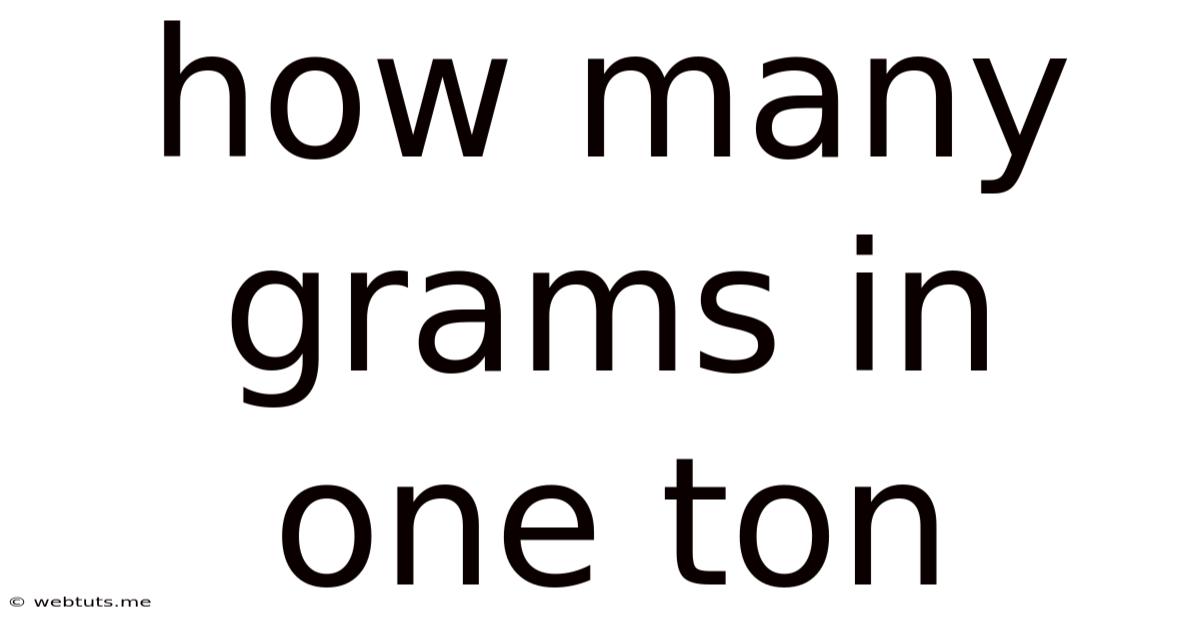How Many Grams In One Ton
Webtuts
May 13, 2025 · 4 min read

Table of Contents
How Many Grams in One Ton? A Comprehensive Guide to Metric Conversions
Understanding unit conversions is crucial in various fields, from everyday life to complex scientific calculations. One common conversion that often causes confusion is determining how many grams are in a ton. This comprehensive guide will not only answer that question but also delve into the intricacies of the metric system, explore different types of tons, and provide practical examples to solidify your understanding.
Understanding the Metric System
The metric system, also known as the International System of Units (SI), is a decimal system based on powers of 10. This makes conversions relatively straightforward compared to other systems like the imperial system. The fundamental units in the metric system are:
- Meter (m): The base unit of length.
- Kilogram (kg): The base unit of mass.
- Second (s): The base unit of time.
From these base units, other units are derived, often using prefixes to indicate multiples or submultiples of the base unit. These prefixes are based on powers of 10, making conversions easy:
- Kilo (k): 1000 (10³)
- Hecto (h): 100 (10²)
- Deka (da): 10 (10¹)
- Deci (d): 0.1 (10⁻¹)
- Centi (c): 0.01 (10⁻²)
- Milli (m): 0.001 (10⁻³)
- Micro (µ): 0.000001 (10⁻⁶)
- Nano (n): 0.000000001 (10⁻⁹)
Understanding these prefixes is key to effortlessly navigating metric conversions.
The Different Types of Tons
The term "ton" can be ambiguous because it refers to different units of mass depending on the system used. This is a major source of confusion when performing conversions. The primary types of tons are:
-
Metric Ton (tonne): This is the most commonly used type of ton in the metric system. It's equal to 1000 kilograms.
-
Short Ton (US ton): Used primarily in the United States, it's equal to 2000 pounds.
-
Long Ton (UK ton): Primarily used in the United Kingdom, it's equal to 2240 pounds.
The discrepancies between these tons highlight the importance of specifying which type of ton you're working with to avoid errors.
How Many Grams in a Metric Ton?
Now, let's address the core question: how many grams are in a metric ton? Since a metric ton (or tonne) is equal to 1000 kilograms, and there are 1000 grams in a kilogram, the calculation is straightforward:
1 metric ton = 1000 kg * 1000 g/kg = 1,000,000 grams
Therefore, there are one million grams in one metric ton. This is a crucial conversion to remember when dealing with large quantities of mass.
How Many Grams in a Short Ton?
To calculate the number of grams in a short ton (US ton), we need to first convert pounds to kilograms and then kilograms to grams.
1 short ton = 2000 pounds
Using the approximate conversion of 1 pound to 0.453592 kilograms:
2000 pounds * 0.453592 kg/pound ≈ 907.185 kg
Now, converting kilograms to grams:
907.185 kg * 1000 g/kg ≈ 907,185 grams
Therefore, there are approximately 907,185 grams in one short ton. Note that this is an approximation due to the rounding in the pound-to-kilogram conversion.
How Many Grams in a Long Ton?
The conversion for a long ton (UK ton) follows a similar process. A long ton is equal to 2240 pounds.
2240 pounds * 0.453592 kg/pound ≈ 1016.05 kg
Converting kilograms to grams:
1016.05 kg * 1000 g/kg ≈ 1,016,050 grams
Therefore, there are approximately 1,016,050 grams in one long ton. Again, this is an approximation.
Practical Applications and Examples
Understanding these conversions has various practical applications across different fields:
-
Logistics and Shipping: Calculating shipping costs often involves converting tons to grams or other units depending on the weight-based pricing structures.
-
Engineering and Construction: Material quantities in large-scale projects are frequently expressed in tons, requiring conversions for precise calculations.
-
Agriculture: Yields and fertilizer requirements are often measured in tons, requiring conversion to grams for smaller-scale applications.
-
Scientific Research: Precise mass measurements are essential in scientific experiments, often demanding conversions between different units like tons and grams.
Example 1: A construction project requires 5 metric tons of cement. How many grams of cement are needed?
5 metric tons * 1,000,000 grams/metric ton = 5,000,000 grams
Example 2: A shipment contains 2 short tons of goods. What's the approximate weight in grams?
2 short tons * 907,185 grams/short ton ≈ 1,814,370 grams
Example 3: A farmer harvests 3 long tons of wheat. What is the approximate weight in grams?
3 long tons * 1,016,050 grams/long ton ≈ 3,048,150 grams
Conclusion: Mastering Metric Conversions for Success
Mastering unit conversions, especially those involving tons and grams, is essential for accuracy and efficiency in numerous fields. Remembering the differences between metric tons, short tons, and long tons, and applying the correct conversion factors, will prevent costly errors and ensure your calculations are precise. By understanding the fundamental principles of the metric system and applying the knowledge presented in this guide, you'll gain confidence in handling these conversions effectively. The ability to seamlessly convert between units will significantly enhance your problem-solving skills and overall understanding of quantitative concepts. Always double-check your work and remember to specify the type of ton you are using to avoid ambiguity.
Latest Posts
Latest Posts
-
How Many Hours Is 8 Weeks
May 13, 2025
-
How Many Seconds In 48 Hours
May 13, 2025
-
How Much Is 91 Ounces Of Water
May 13, 2025
-
What Is 400 Minutes In Hours
May 13, 2025
-
How Much Is 2 3 Cups In Tbsp
May 13, 2025
Related Post
Thank you for visiting our website which covers about How Many Grams In One Ton . We hope the information provided has been useful to you. Feel free to contact us if you have any questions or need further assistance. See you next time and don't miss to bookmark.